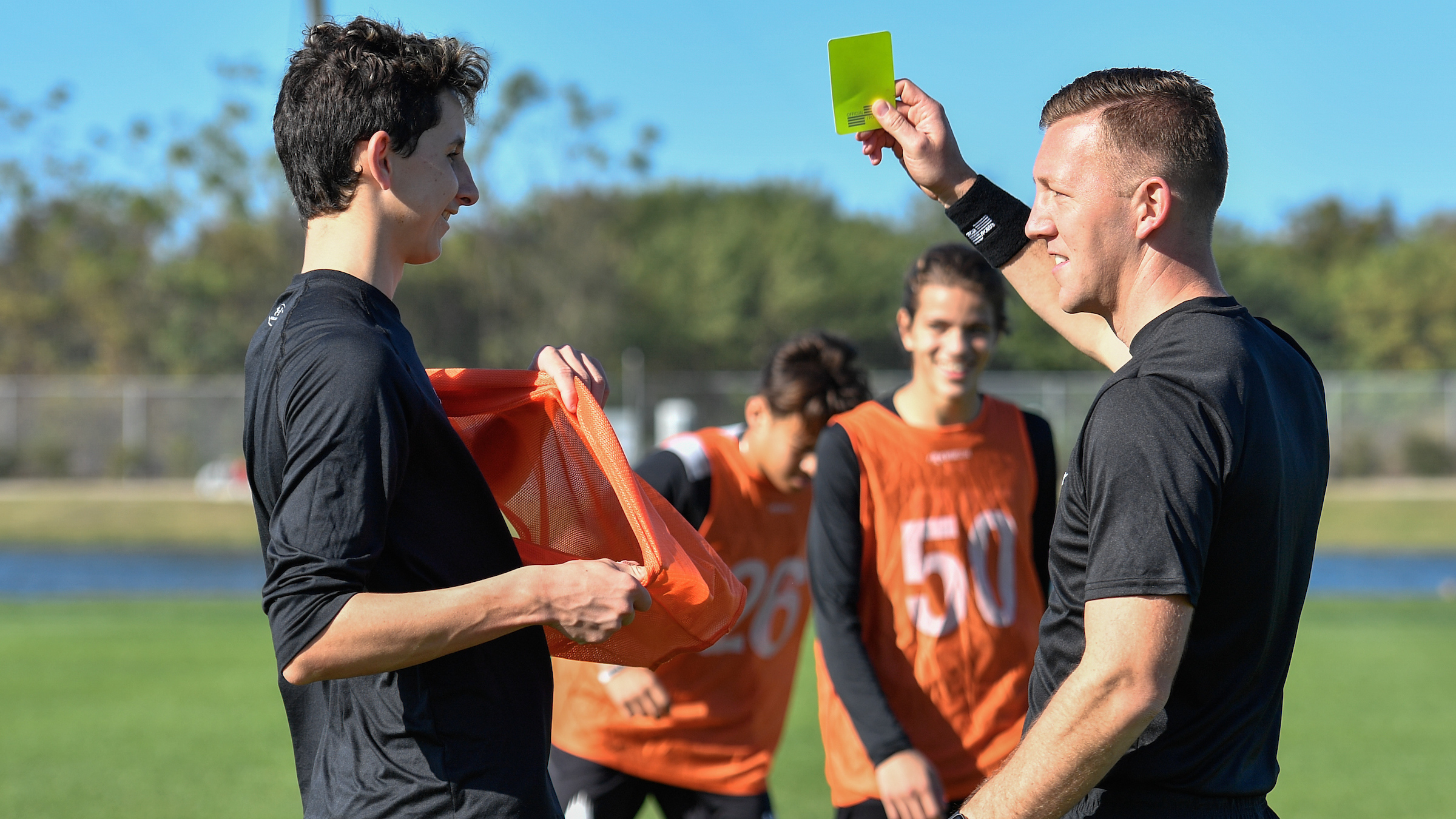Five Reasons Why You Should Become a Youth Soccer Referee

By Adam Schwager
SoccerWire Contributor and Certified Referee
From an outsider’s perspective, refereeing youth soccer can seem like an unenviable, thankless job. If you’re just doing it for the money, I’m sure it can feel that way sometimes.
However, if you truly have a passion for the game, refereeing is an incredible outlet to get your soccer fix. And while the money won’t pay your bills, refereeing puts a considerable amount of money into your pocket that you wouldn’t have otherwise if you stayed at home all weekend.
Here are SoccerWire’s five reasons why you should become a certified referee:
1. A Greater Understanding of the Game
Even if you never actually set foot on the pitch to call a game, sacrificing a weekend of your life to take a referee course will open up your understanding of the laws of the game immensely.
As a player, you will have a greater knowledge of what referees will and won’t call, and adjust your game accordingly.
[+READ: Five tips on how to properly handle conflict as a soccer Referee]
As a coach, you’ll learn how to pick-and-choose your arguments over truly controversial calls, instead of wasting your legitimacy complaining about automatic calls that are universally enforced. Nothing makes a referee tune out a coach faster than multiple arguments that are clearly not based in the laws of the game.
2. Give Back to the Game
Unfortunately, not everyone who rises up through the soccer ranks will make it professionally. Even if you have an excess amount of passion for the game, almost everyone except for the top .01% of players will plateau at some point.
If you’ve finished your high school career or, if you’re fortunate enough, your college career, not having soccer can leave a massive hole in your life. You can always take up youth coaching, but if your new adult schedule doesn’t provide the time during the weekdays for you to manage practices and handle disgruntled parents upset about their kid’s playing time, refereeing can serve as a way to find your passion again.
The referee community, for the most part, absolutely loves the game and can become the soccer family that you lack once your playing days are over.
3. Get Paid to Exercise
As we get older, many of us find ourselves stuck in office jobs that force us to sit at our desks, starting at a screen for 40 hours a week. Former competitive athletes can have a particularly rough time transitioning to this kind of schedule, as eating habits are harder to break than exercise habits.
I personally struggle with finding time during the week to get consistent workouts in, and even when I have the time, finding the motivation to complete an isolated workout can be difficult. As a referee, you often find yourself too lost in the flow of the game to worry about how much you’ve run.
[+READ: Certified Referee Breaks Down the new IFAB Laws of the Game]
According to my Apple Watch, I generally average six miles a game for a 90-minute center assignment, and around three miles a game when serving as an Assistant running the lines. After refereeing a traditional three-game set, you’ve run 12 miles over the course of six hours, without even noticing it. Complete two sets a weekend and you’re basically running a marathon over two days every weekend, all while coming away with a couple hundred dollars that you wouldn’t have otherwise.
4. Watch High-Level Games
Some of the most exciting soccer games I’ve ever had the pleasure of watching came while I was running lines or in the center circle. I’ve seen teams come back from 4-0 deficits in the final 20 minutes to win 5-4, along with countless incredible goals, clutch saves and impressive skill moves.
The American game has also evolved over the last decade, and you may get a chance to referee some budding stars in their youth. Last weekend, one of my referee partners noted that he had the privilege of refereeing Griffin Yow, a 17-year old phenom who just scored his first goal for D.C. United on Saturday, multiple times throughout his youth career. As you keep moving up in the refereeing world, you can find plenty of opportunities to call games for some of the elite clubs in your area and potentially spectate early games for the future premier talent of the sport.
5. Continue the Drive to Improve
Soccer players, and all elite athletes, are driven by their goals to improve in all aspects of the game. While at a certain level, that improvement becomes harder and harder to come by, refereeing presents a whole new mountain to climb. If you’re young, fit and have a passion for the game, you can continue rising through the ranks of USSF to potentially work your way up to the highest levels.
Before Mark Geiger rose to the top of the ladder for United States referees, he worked as a math teacher in New Jersey. Geiger had a drive to improve, and he continued to work higher and higher level games, ultimately working six World Cup games in his career. Geiger obviously represents the top tier of refereeing in the United States, but his story proves that your drive to reach the top of the soccer world does not have to end when your playing days are over.
SOCCERWIRE MARKETPLACE
- FC Bayern Soccer Camps - $30 PROMO CODE: BMSOCCERWIRE
- Real Colorado Cup 2026
- Join a College Coaches Showcase Camp Today
- MICFootball Punta Cana 2026
- Dana Cup Hjørring 2026
- 15th Annual Loudoun Soccer College Showcase
- OFFICIAL FC BARCELONA SOCCER CAMPS - PROMO CODE: FCBSOCCERWIRE
- New England Copa Surf 2026
- Adidas National Cup 2026
- Boston International Cup Memorial Day 2026

















